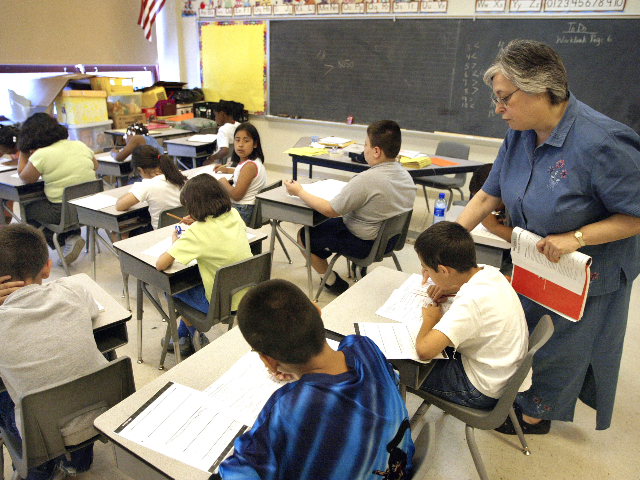A Silicon Valley elementary school recently told third-graders to rank themselves according to their “power and privilege,” whistleblower documents revealed.
A third-grade teacher at the R.I. Meyerholz Elementary School in well-to-do Cupertino, California, conducted a lesson on “social identities” during a math class, Christopher Rufo reported at Manhattan Institute’s City Journal.
According to the report, based on the whistleblower documents and parents’ comments, the teacher asked the young children to create an “identity map,” composed of characteristics such as race, class, gender, religion, and family structure.
Next, the teacher taught the children they live in a “dominant culture” of “white, middle class, cisgender, educated, able-bodied, Christian, English speaker[s],” with others of privilege who “created” their culture in order “to hold power and stay in power.”
The young children then read from the New York Times bestseller, This Book Is Antiracist, only to learn their “privilege” allows them “power over others.”
Rufo reported:
As an example, the reading states that “a white, cisgender man, who is able-bodied, heterosexual, considered handsome and speaks English has more privilege than a Black transgender woman.” In some cases, because of the principle of intersectionality, “there are parts of us that hold some power and other parts that are oppressed,” even within a single individual.
The third-graders then deconstructed their own identities and were asked to “circle the identities that hold power and privilege” on their maps and rank them using the hierarchy they were taught.
Additionally, Rufo noted the children received another related essay assignment of “at least one full page of writing” describing their powerful and privileged identities.
“As an example, the presentation included a short paragraph about transgenderism and nonbinary sexuality,” he wrote.
Parents were reportedly outraged when they discovered the lesson and assignment.
“We were shocked,” one Asian-American parent told Rufo. “They were basically teaching racism to my eight-year-old.”
This parent organized others to protest the school’s “intersectionality curriculum.” Eventually, the parents met with Jenn Lashier, the school principal, and demanded the instruction end. According to the report, Lashier ultimately agreed to suspend the curriculum.
Rufo explained the paradoxical situation:
The irony is that, despite being 94 percent nonwhite, Meyerholz Elementary is one of the most privileged schools in America. The median household income in Cupertino is $172,000, and nearly 80 percent of residents have a bachelor’s degree or higher. At the school, where the majority of families are Asian-American, the students have exceptionally high rates of academic achievement and the school consistently ranks in the top 1 percent of all elementary schools statewide. In short, nobody at Meyerholz is oppressed, and the school’s high-achieving parents know that teaching intersectionality instead of math is a waste of time—and potentially dangerous.
Rufo reported one parent noted that Critical Race Theory is a reminder of the Chinese Cultural Revolution in that its goal is to portray society as divided between those who are oppressors and those who are the oppressed. The parent explained:
[S]ince these identities are inborn characteristics people cannot change, the only way to change it is via violent revolution. Growing up in China, I had learned it many times. The outcome is the family will be ripped apart; husband hates wife, children hate parents. I think it is already happening here.
Rufo reported that what has happened in this one elementary school is but an example of what has grown into a “larger development” of mobilization by West-Coast Asian-Americans against affirmative action.
In October 2019, he reported on Asian-Americans in Washington, organizing to resist the radical leftwing agenda that demands “diversity, equity, and inclusion.”
The families rebelled against the Democrats’ affirmative action laws that actually penalize academically successful Asian-American students by limiting their admissions to the University of Washington system.
Rufo reported other Asian-Americans in California have been successful in 2020 as well.
“In both cases, they defended the principles of meritocracy, individual rights, and equality under the law—and roundly defeated a super-coalition of the states’ progressive politicians, activists, universities, media, and corporations,” Rufo noted, observing the leftwing mantra of “systemic racism” and “white supremacy” has made Asian-Americans an “inconvenient minority.”
As Breitbart News also reported in November, the North Thurston Public School district in Washington released a statement in its “equity report” in which officials were forced to apologize for ejecting Asian-American students from their “students of color” category because they were performing satisfactorily. The report had grouped white and Asian-American students together.
While the school district attempted to justify its actions with its intention to “make equity-based decisions,” after an apparently significant response from the community’s Asian-American families, officials apologized “for the negative impact we have caused” and removed the “equity report” from the district’s website.
In November, a federal appeals court upheld Harvard University’s affirmative action policy that had been challenged by a group that alleged the Ivy League school discriminates against Asian-Americans.
Ilya Shapiro, director of constitutional studies at the Cato Institute, commented to USA Today he was not surprised by the ruling.
“The case was always designed to go to the Supreme Court and now it will,” he said. “It’s high time that the justices end the 40-year error of interpreting the Constitution to allow universities that accept public funding to use racial preferences in admissions decisions.”

COMMENTS
Please let us know if you're having issues with commenting.